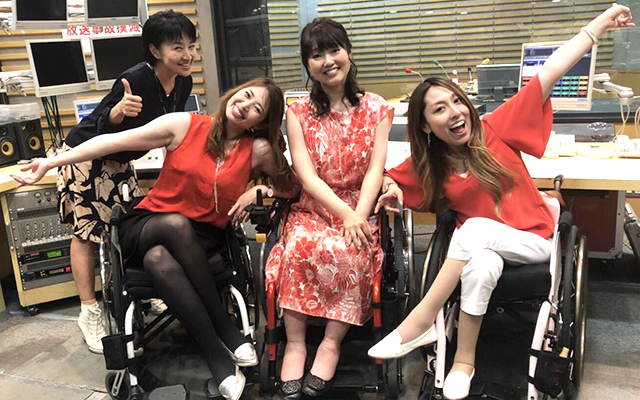
© Nippon Broadcasting and © Beyond Girls
Dynamic Wheelchair-Riding Girls Unit “Beyond Girls” Celebrate Difference [Interview]
- Tags:
- All Night Nippon-i / barrier-free / barrier-free mentality / Beyond Girls / Choreography / Dance / girl unit / Model / Nippon Broadcasting System / Performer / Radio / singer / web radio / Wheelchair / wheelchair accessible / YouTuber
Related Article
-
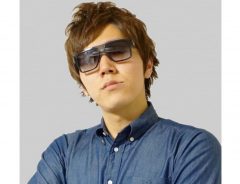
Watch slapstick YouTuber Hikakin keep a straight face interviewing Tokyo governor Koike
-
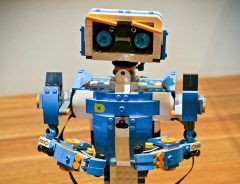
Check out the LEGO robotics on this YouTuber’s channel
-
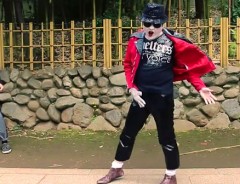
Another Japanese Comedian Fizzling Into Oblivion… So He’s Trying Something New
-

A Winning Smile: A Cute Toddler With Down’s Syndrome Gets A Modeling Contract
-
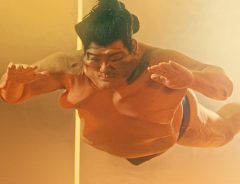
Sumo Wrestler Turns Into Flabby Bird In Indoor Skydiving Center’s Promotional Video
-

Utada Hikaru’s son picks a Pokémon for mom’s Halloween costume and fans can’t get enough


Introducing "Beyond Girls"
With permission from © Beyond Girls
Beyond Girls is a new girls unit now enjoying popularity in Japan, not only for their uplifting music but also for their positive message promoting diversity and acceptance of differences of all kinds and their active role in promoting a "barrier-free mentality" within Japanese society. Beyond Girls' activities range from music to acting, modeling, lecturing at events and broadcasting their own YouTube channel.
Eri Umetsu, Ayako Ozawa and Ryoko Nakajima, who shared the experience of becoming wheelchair-users later in life, originally decided to join forces in November, 2017, leveraging their life experiences to promote a message of accepting and enjoying difference. Temporarily calling themselves "Wheelchair Girls," they openly solicited suggestions for an official name and decided on "Beyond Girls" in February 2018, when they began their activities in earnest.
According to their official website, their three main areas of activities are: "Action," consisting of YouTube broadcasts and speaking out to promote a "barrier-free" environment, "Creative," which covers their activities as musical artists, as well as modeling and holding special events, and "Talk," which involves lectures as well as offering "barrier-free" consultation to organizations.
Appearance On Nippon Broadcasting System's "All Night Nippon-i"
Nippon Broadcasting System has a long history of promoting and supporting a "barrier-free" society through such initiatives as their "Radio Charity Music-thon" to fund the installation of sound-enabled traffic lights, or broadcasting shows such as "Challenge Athlete," focusing on the motivational stories of athletes with disabilities and the people who support them. Therefore, they welcomed the opportunity to invite Beyond Girls to be personalities in a special edition of their popular web radio show "All Night Nippon-i," which was broadcast on June 29th and July 6th. Topics ranged from their own personal life challenges, their activities as wheelchair-riding entertainers, their thoughts on the current state of wheelchair accessibility in Japan, and more fun topics such as surfing, paragliding and other sports and leisure activities for wheelchair users in the Tokyo area, and their thoughts on romance and dating.
One of the highlights of the show was when they introduced "Beyond Everything," their first original song which is soon to be released as a single. As you'll notice from the lyrics, posted further below, it's an inspirational song with an uplifting message.
With permission from © Nippon Broadcasting and © Beyond Girls / Photo by © grape Japan
With permission from © Nippon Broadcasting and © Beyond Girls / Photo by © grape Japan
With permission from © Nippon Broadcasting and © Beyond Girls
Interview With Beyond Girls
We had the good fortune of being invited into the studio for the broadcast, after which we interviewed Eri, Ayako and Ryoko...
With permission from © Nippon Broadcasting and © Beyond Girls / Photo by © grape Japan
"Barrier-Free" Mentality
gJ: So, you talked about a “barrier-free mentality” in the show. Do you think it’s important for you to promote this mentality yourselves or do you hope that people around you will change, or both?
Ayako: Both, I’d say. We need to speak up, too…
Eri: If we don’t say anything, [people without disabilities] won’t notice, they won’t notice we exist… We can’t just wait. We need to take action on our side…
Ayako: We can’t just wait, try to endure and do nothing but complain...
gJ: OK, so what does this “barrier-free mentality” involve, specifically? During the show, you gave the example of talking to someone [in a wheelchair] to provide help. Are there other things?
Ryoko: We’re happy when someone simply asks, without standing on ceremony: “Do you need help,” for example… I think there are many people who want to talk but just can’t… But even one word can make a difference… We may reply: “Oh, it’s ok, thank you!” but we’re still happy you said it.
Eri: People talking to you [to offer help], and other things if they come naturally...
Ryoko: Like in elevators?
Eri: Right, when people let you go in first without saying anything. The fact that they notice, I think that’s a “barrier-free mentality.”
Ayako: I don’t want people to differentiate, you know… think of us as somehow different than other people.
Eri: Show reserve?
Ryoko: Yes.
Ayako: We’re humans like you and we can share the same feelings, like being happy or sad... I want people to think of us as friends.
Ryoko: The other day, I met friends from high school I hadn’t seen in a long time, about five of them. They’ve been with me ever since I was in a wheelchair when I was nine years old, so they have an incredible “barrier-free mentality.” Because they’ve always been with me...
Ayako: It’s just second nature to them...
Ryoko: ...Pushing my wheelchair just comes naturally to them. When there was a step, they were all like: “OK, here we go,” and they just pushed [my wheelchair] like that.
Ayako: That’s nice.
Ryoko: That made me so happy. Until now, I haven’t really seen people like that in society. Many people are like: “What should I do?” when they see me, you know what I mean? So, being with my old friends made me realize they have a “barrier-free mentality” ... They get it because they were with me all that time. I hope everyone can be like that...
Eri: It would be nice if people behaved naturally towards us, people with disabilities...
Ayako: When I went to Denmark, I visited a school where there were many students with serious disabilities together with students without disabilities, which I thought was amazing. But when I told them: “That’s amazing. It’s an amazing situation,” they responded: “What’s amazing about it?” … I was jealous of the fact that it was natural to them… People with disabilities and people with no disabilities together...
Ayako: I hope we can get rid of mental barriers...
gJ: I see... So, through your activities in Beyond Girls, reaching out to the public to promote a “barrier-free mentality” is one of your objectives?
Ryoko: That’s our main objective.
Ayako: We’d also like people to feel closer to us...
Eri: For that to happen, we’d like [people with disabilities] to be more and more active like us, and go out into the city...
Ryoko: People with disabilities who are go-go-go!
Eri: They don’t have to be go-go-go, but it would be great if they could go out into the city without any sense of hesitation. If we can help spread the “barrier-free mentality,” it will become easier for everyone [with disabilities] to go out, and if everyone goes out, that opens more possibilities for the city.
Ryoko: It would be great if it became mutually beneficial...
Ryoko: Filmmaking and Beyond
gJ: Now, I have specific questions for each of you. Ryoko, you were involved in film-making when you went to the United States. What kind of films did you make?
Ryoko: At first, I was a critical studies major. I love watching movies, so I spent my days watching movies and writing reports on them. But I watched too many, got tired of it and I started hating movies. So, I thought I’d try out the production side instead, and after graduating, I went to a film school. Since I was in a wheelchair… Do you know camera dollies? You put a camera on a wheelchair and pull it… that’s the work of the dolly grip. So, they told me: “Ryoko, why don’t you be the dolly grip!” ... (all laugh) That was my job… But when I went out on location, there were steps and obstacles and I had a hard time, so in the end, I figured I was more suited for editing work... I’d really get a rush when I was able to put everything together and create a cool video. I loved that, so I kept doing editing. I’d like to continue editing our videos for Beyond Girls too!
Ayako: Message to the World
gJ: Ayako, I’d like to ask you a question. You traveled abroad before, but in the future... Is there any chance that all three of you, Beyond Girls, will go on tour abroad?
(All): I want to go!!
Ayako: As part of Beyond, it would be great if we could travel the world...
Ryoko: That’s a project I’d love to do.
Ayako: When I went abroad for my first time since being in a wheelchair, I was worried that traveling when you’re in a wheelchair would be hard, so I was a bit hesitant to go, but when I finally went, things just worked out and I had a wonderful time. If the three of us can make a trip, I’d like to see all kinds of things and communicate our message to the world!
Eri: I’m sure we’d get no sleep… We’d be up all night chatting...
Ayako: (Laughs) Let’s sleep properly and communicate our message!
"Barrier-Free" Environment in Japan
Ryoko: It would be great if we could go… Not only abroad but within Japan too...
Ayako: In Japan too, right. As we get closer to 2020, I think more travelers will be coming to Japan, including many people in wheelchairs. As the graying of our society continues, there will be people with disabilities, people who don’t have full use of their bodies… But if there’s something the three of us can do to help them enjoy traveling… Maybe we can try things out...
Eri: Maybe we could do something as Beyond Girls...
gJ: Yes, on the show, when you talked about various places in Tokyo, modes of transportation like the Oedo Line that are wheelchair-friendly, special motorbikes you can ride in with a wheelchair, things like that, it occurred to me that such information would also be very useful to foreign travelers coming to Japan with their wheelchairs...
Ayako: I’d like many people to come see the Paralympics, and of course, many athletes will be coming too...
Ryoko: It would be a shame if they felt that things were inconvenient in Tokyo, right?
Ayako: No, I don’t want that...
Eri: Cool Dancing in a Wheelchair
gJ: This question is for Eri. On your website, it said that you resumed dancing...
Eri: Beyond Girls dancing?
Ryoko: Our dance team? (all laugh)
gJ: Was that information correct?
Eri: Well, I did get advice from a famous choreographer...
gJ: So, Eri, have you done or do you plan on doing choreography for Beyond Girls?
Eri: Yes.
Ayako: There’s already one song.
Ryoko: She already has for one song, so please come and see us when we perform it!
Eri: Well, I didn’t make it, rather I adapted it...
Ayako: An adaptation
Eri: I adapt choreography for us. From 8 years old, I did ballet and aerobics...
gJ: So, when you perform on stage, for example, your new song, will you be incorporating some choreography?
Eri: That’s right. We have a professional dancer who does our choreography...
Ayako: And it’s perfect for a dance which incorporates sign language...
Eri: But this person isn’t the one who dances on stage [during our shows]. No experience using a wheelchair…So we’ve adapted it to make it easy for us to dance.
Ayako: We work on it together...
Ryoko: That’s right.
Eri: Actually, dancing in wheelchair isn’t so widespread... Well, there are some people doing it but it’s not in high demand yet, so I think it still has a long way to go… But we’d like to promote cool [wheelchair] dancing through Beyond Girls...
Ayako: We’d like to show everyone that you can also do cool dancing in a wheelchair, and then we’d have sign language for people who are deaf.
Ryoko: There’s a club event coming up, where everyone will be dancing.
gJ: You’ll have a DJ?
Eri: Right, we’ll be party people! (all laugh)
gJ: Thank you for your time!
With permission from © Beyond Girls / Photo by Maki Nonaka
Lyrics of "Beyond Everything"
Beyond Everything
Beyond everything
You can go beyond differences
Even though you spent a lot of nights with tears.
Beyond Everything
You can go beyond everything
You are not alone anymore
Under a boundless sky, A step you take.
You just start your story only for you.
Release yourself without any hesitation.
Even though you spend a day, feeling why it was only me, you can shout
your voice deep inside you.
Beyond everything
You can go beyond tears
Even though you sometimes spent a morning you want to escape from everything.
Beyond Everything
You can go beyond everything,
Believing yourself that is one and only one.
gJ: So, just would like to ask you about your new song, Beyond Anything, can you tell me what it’s about?
Ryoko: We just want to get beyond everything like obstacles and barriers, countries and ages… everything, I think we can get beyond everything if we believe in it! We want to communicate that feeling to everybody, including handicapped people, to disabled and non-disabled people…We want to communicate this feeling to everybody.
Profiles
Eri Umetsu
With permission from © Beyond Girls
Born in Akira Prefecture. Graduated from the Department of Early Childhood Education at Shotoku University Junior College. At the age of 27, when Eri was a kindergarten school instructor and a surfing enthusiast, she developed lupus, became paralyzed in both her upper and lower limbs, and suffered damage to her brain and spine. After six difficult years in a coma wavering between life and death, she regained consciousness, went through rehabilitation and finally was discharged from hospital in 2012. Her trusty wheelchair is the motor-assisted Yamaha JW Swing. In 2017, she began modeling in fashion shows and MCing at events, and even resumed surfing and dancing after 13 years.
Ayako Ozawa
With permission from © Beyond Girls
Born in Kimitsu, Chiba Prefecture. Graduated from the Management Department of Meiji University. Ayako has a disability in her upper and lower limbs due to progressive muscular dystrophy. She has been using a wheelchair since 2017. She currently works at IBM Japan, while enjoying a range of other activities. As a singer-songwriter, her songs address her plight against muscular dystrophy. Also active as a lecturer, a model and a performer, she is often invited to schools and hospitals where she performs. She formed the group Beyond Girls in 2018 and is active as its leader. Her hobbies include diving, barbecues, fishing, snorkeling, cooking and traveling. She has traveled to 20 countries around the world. In April, she published her first book, "To You Ten Years Ago: Living With Muscular Dystrophy" (Hyakunen Shobo, Souvenir Bunko).
Ryoko Nakajima
With permission from © Beyond Girls
Born in Ota Ward, Tokyo. At the age of nine, Ryoko suddenly became paraplegic and began living life using a wheelchair. When she was feeling hopeless due to her disability, she was moved by the film Titanic and began watching movies. In the process of experiencing different values and cultures of the world, Ryoko began aspiring to a career in film, and she dreamed of making films that would inspire others. To realize her dreams, she traveled alone to the United States. After graduating from the School of Cinematic Arts at the University of South California, she returned to Japan and found work as a video editor. In November 2017, she began activities as an influencer and entertainer promoting a "barrier-free" environment in Japan within various fields. She began interacting with numerous fans through social media and YouTube and continues to expand her range of activities, doing things such as making a movie soliciting volunteers for the 2020 Olympics and appearing in TV variety shows.
Beyond Girls Links
With permission from © Beyond Girls / Photo by Maki Nonaka